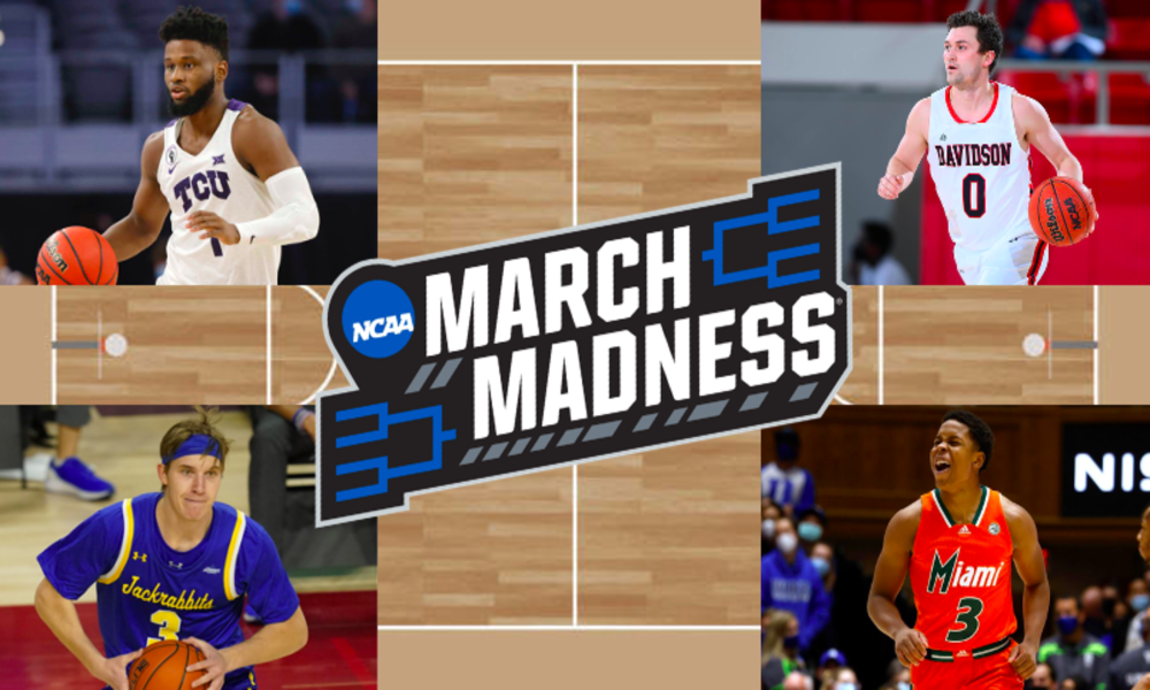Everyone Loves an Underdog in March
With just under a month until 2022 NCAA Selection Sunday, the madness is almost here. Bracketology has begun, Joe Lunardi is beginning to stress out college programs with his weekly “Last Four In” and “First Four Out” predictions, and basketball fans everywhere are getting ready to put in their request offs from work on March 17th-18th for the round of 64. Last year it was Oral Roberts (15), Syracuse (11), Oregon State (12), and UCLA (11) who made the Sweet 16 as double-digit seeds. In 2022, these are four teams currently ranked outside of the top 50 in NET (NCAA Evaluation Tool) who look poised to make the tournament as a lower seed and could become the newest favorite underdogs of March Madness:
Texas Christian Horned Frogs (16-6)

Bracketology Resume
Projection: 81.3% chance to make tournament, projected #10 seed
NET: 54 RPI: 59
QUAD 1 record: 4-4 QUAD 2 record: 3-2

TCU does not have the offensive prowess of the next three teams on this list, ranking a brutal 327th in the NCAA in three-point percentage at 29.71% this year. So why are they so intriguing? Even with their shooting struggles, they have managed to achieve a 16-6 record and have quite a few solid big 12 wins this season. The biggest reason for their success has been their ability to completely lock in on defense for long stretches at a time. The Horned Frogs have held their opponents to under 70 points in 15 of their 22 games. Their best game of the season came on January 22nd when the Frogs went into Iowa State’s Hilton Coliseum and held ISU to 44 total points in front of their home crowd.
In the case of TCU’s offense, they go as Mike Miles goes. Miles is a 6’2” guard who helped the U19 USA team win the 2021 FIBA World Cup, posting 11 points, 7 rebounds, 6 assists, and 4 steals in the U19 USA team’s 83-81 victory over France. He currently averages 15.4 PPG and in games that Miles scores 16+ points, the Frogs are 8-2. His shooting splits have actually regressed from last season, but it is only a matter of time before he finds his shooting stroke again and TCU starts to flirt with their ceiling this season. Chuck O’Bannon Jr., a 5th year senior, has also had a break out season, leading TCU in 3FG% and has worked his way into the starting lineup.
The Horned Frogs have lineup flexibility with the ability to go big or small depending on the matchup are not afraid to grind out low scoring games. With 5 upcoming Big 12 games against currently-ranked top 25 opponents, it will be interesting to see if TCU can rise to the occasion the last month of the season. Regardless, If Mike Miles can get hot at the right time, TCU will be a very tough matchup come March.
Davidson Wildcats (20-4)

Bracketology Resume
Projection: 70.8% chance to make tournament, projected #11 seed
NET: 61 RPI: 28
QUAD 1 record: 2-1 QUAD 2 record: 2-3

Davidson is a team who have sputtered a bit as of late, needing overtime to beat Saint Joseph’s at home and losing to Rhode Island on the road. Despite this, the Wildcats are a sound team who can compete with anyone in the nation. They have very notable road wins against VCU, St. Bonaventure, and Richmond, as well as an impressive neutral-site win against Alabama. Davidson is projected to win the A10 Conference for the automatic qualifying spot, but even without the auto-bid, they still have a proficient resume to make the tournament.
Davidson has a very balanced scoring attack with three players who average over 15 PPG in Foster Loyer, Hyunjung Lee, and Luka Brajkovic. All three of them can drop 25-30 points and exploit their matchup any given night, which is what makes them so deadly. Loyer has 7 games with 20+ points, including a 35-point performance against Northeastern. Lee has 4 games with 20+ points, including a 32-point showing against Charlotte. Brajkovic has 6 games with 20+ points, including a recent 30-point game against George Washington. On top of this, Michael Jones averages 12.3 PPG on 48.5/44.0/86.9 shooting splits and has had his two biggest games in two of their toughest games, when he scored 29 at Richmond and 21 vs Alabama.
Overall, the wildcats are an efficient offensive team who rank 14th in the nation in FG% (48.66%). On top of this, they are one the 17th best free-throw shooting team in the nation (77.43%). Look for them to get consistent high-quality shots against whoever is unlucky enough to draw them in the first round of March Madness.
Miami (FL) Hurricanes (18-7)

Bracketology Resume
Projection: 72.6% chance to make tournament, projected #11 seed
NET: 68 RPI: 44
QUAD 1 record: 3-1 QUAD 2 record: 5-4

The Miami Hurricanes were counted out early on before the season even began, projected to finish 12th out of the 15 ACC teams for 2021-2022. While they have had their ups and downs this season, they are stacking up some very impressive QUAD 1 road game wins, most notably at Duke in early January and very recently at Wake Forest. They are 10-4 in ACC play and are a fantastic 4-1 against the other top-echelon teams in the ACC standings. While they are not amazing at anything in particular, they are a very strong and balanced team all-around. They are also led by one of the most experienced coaches in college basketball, Jim Larrañaga, who is looking to bring Miami (FL) to their first March Madness since 2018.
The Canes starting lineup consists of players who have 21 total seasons under their belts, making them one of the oldest teams in the NCAA. They are led by 5th year seniors, Kameron McGusty and Charlie Moore, who average 17.8 and 12.3 PPG respectively. The only starter without 4+ years of college basketball experience is 3rd-year sophomore, Isaiah Wong, who leads Miami in minutes played and adds 15.8 PPG himself.
Larrañaga’s squad plays a great scrambling defense, which leads to 8.8 steals per game (good for top 25 in the nation). All four of their starting guards average over a steal per game and they do so while being 231st in pace of play, meaning their steal percentage is even more impressive. Miami has also played in 12 games in which the final score was a two-possession game or closer, so when March rolls around it wouldn’t be surprising to see their game come down to the wire.
South Dakota State Jackrabbits (23-4)

Bracketology Resume
Projection: 59.5% chance to make tournament, projected #13 seed
NET: 74 RPI: 51
QUAD 1 record: 1-2 QUAD 2 record: 1-0

Last year, it was Oral Roberts from the Summit League who broke everyone’s brackets. This year, SDSU could very well replicate that run and once again represent the Summit League well. SDSU has one of the most ultra-offensive and highly-efficient outside shooting teams in the nation. They rank 2nd in total offense and field-goal percentage, behind just Gonzaga, and rank first in 3-point shooting percentage in the nation at 44.96%. This is 3.5% better than the 2ndranked team in the nation (Virginia Tech, 41.46%). The Jackrabbits will likely need to win the Summit League to make the tournament but look to be heads and shoulders above Oral Roberts and North Dakota State at the moment.
The Jacks are led by 6’6” “do it all” sophomore guard, Baylor Scheierman, who leads the team in total points, rebounds, assists, and steals. Douglas Wilson, a 6’7” senior forward, adds 15.1 PPG as well and SDSU goes a solid 8-deep, with a plethora of long-range shooters. The wildcard is Noah Freidel, who was averaging 18.2 PPG before having an undisclosed 2-month absence. He has played garbage time minutes the last two games and is a big part of why SDSU can be so scary to face if he returns to form.
Perhaps the biggest question-mark on whether or not SDSU can be successful in March is their lack of size. With no rotation player being taller than 6’8”, a bad draw in the first few rounds could lead their small-ball style into issues on the boards and defending the paint. With that being said, the Jacks have three players (Alex Arians, Zeke Mayo, and Matt Mims) who shoot 88%+ from the free throw line, so if they have the lead late into the game, look for them to hold onto it without issue.




